
Michael Ray Dibdin Heseltine, Baron Heseltine, is a British politician. Having begun his career as a property developer, he became one of the founders of the publishing house Haymarket. Heseltine served as a Conservative Member of Parliament from 1966 to 2001. He was a prominent figure in the governments of Margaret Thatcher and John Major, and served as Deputy Prime Minister and First Secretary of State under Major from 1995 to 1997.
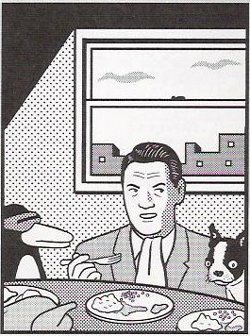
This Modern World is a weekly satirical comic strip by cartoonist and political commentator Tom Tomorrow that covers current events from a left-wing point of view. Published continuously for more than 30 years, This Modern World appears regularly in more than 80 newspapers across the United States and Canada as of 2015, as well as in The Nation, The Nib, Truthout, and the Daily Kos.

Bloom County is an American comic strip by Berkeley Breathed which originally ran from December 8, 1980, until August 6, 1989. It examined events in politics and culture through the viewpoint of a fanciful small town in Middle America, where children often have adult personalities and vocabularies and where animals can talk.

Steven William Maclean Bell is an English political cartoonist, whose work has appeared in a number of publications, notably The Guardian from 1981 to 2023. He is known for his left-wing views.

Spitting Image is a British satirical television puppet show, created by Peter Fluck, Roger Law and Martin Lambie-Nairn. First broadcast in 1984, the series was produced by 'Spitting Image Productions' for Central Independent Television over 18 series which aired on the ITV network. The series was nominated and won numerous awards, including ten BAFTA Television Awards, and two Emmy Awards in 1985 and 1986 in the Popular Arts Category. The series features puppet caricatures of contemporary celebrities and public figures, including British Prime Ministers Margaret Thatcher and John Major and the British royal family. The series was the first to caricature Queen Elizabeth The Queen Mother.
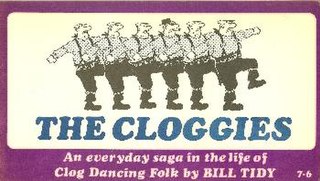
The Cloggies, an Everyday Saga in the Life of Clog Dancing Folk, is a cartoon strip created by Bill Tidy. It ran in the satirical magazine Private Eye from 1967 to 1981, and later in The Listener from 1985 to 1986.

"Badgers", also known informally as "Badger Badger Badger" or "The Badger Song", is an animated meme by British animator Jonti Picking, also known as Mr Weebl. It consists of 12 animated cartoon badgers doing callisthenics, a mushroom in front of a tree, and a snake in the desert. The cartoon is accompanied by a bass line, above which a voiceover sings the names of what is shown on screen.
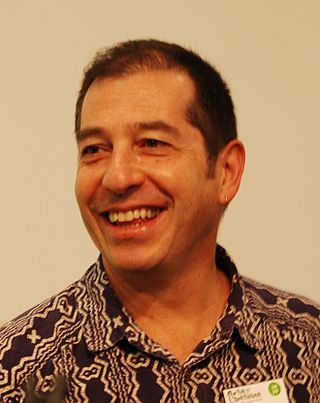
Jonathan Shapiro is a South African cartoonist, known as Zapiro, whose work appears in numerous South African publications and has been exhibited internationally on many occasions. He is the nephew of British magician David Berglas and cousin to Marvin Berglas, director of Marvin's Magic.
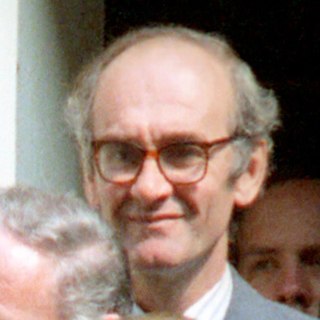
Sir John William Frederic Nott was a British politician. A member of the National Liberal and Conservative parties, he served as Secretary of State for Defence from 1981 to 1983, during the Falklands War.
Patrick Bruce "Pat" Oliphant is an Australian-born American artist whose career spanned more than sixty years. His body of work primarily focuses on American and global politics, culture, and corruption; he is particularly known for his caricatures of American presidents and other powerful leaders. Over the course of his long career, Oliphant produced thousands of daily editorial cartoons, dozens of bronze sculptures, and a large oeuvre of drawings and paintings. He retired in 2015.
Battle for Britain was a comic strip cartoon published in the fortnightly satirical magazine Private Eye in the United Kingdom during the 1980s. It depicted Margaret Thatcher's second term of office as prime minister, but with the politicians shown as British soldiers or Nazi officials, as in a comic of the Second World War. The strip was attributed to Monty Stubble, which was a nom de plume of editor Ian Hislop, and to his artistic collaborator Nick Newman.
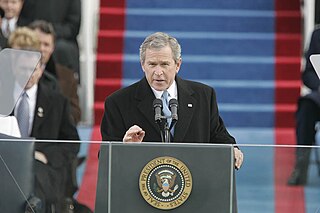
Fictionalized portrayals of George W. Bush, the 43rd President of the United States, have become common since his inauguration on January 20, 2001. Many popular TV shows, magazines, books, and comics have portrayed or satirized him.
Mad is known for many regular and semi-regular recurring features in its pages.

Nkima is a fictional character in Edgar Rice Burroughs' Tarzan novels, and in adaptations of the saga to other media, particularly comics. His name comes from either the word N'kima, or, after the Meru language nickname for Ugali, a dish popular in Kenya and Tanzania made from maize flour.
Sean Delonas is an American political cartoonist and author whose work was for 23 years published by the New York Post as part of their Page Six content. His cartoons are currently syndicated worldwide by Cagle Cartoons.
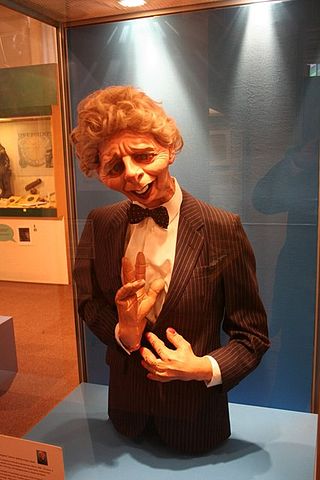
Margaret Thatcher was Prime Minister of the United Kingdom from 1979 to 1990. Her portrayal in the arts and popular culture has been mixed. In the words of one critic she attracted "musical opprobrium like no other British political leader". Such opinion is divergent from mainstream opinion polling which tends to place her as the most popular British prime minister since Winston Churchill.

The Iron Lady is a 2011 biographical drama film based on the life and career of Margaret Thatcher, a British politician who was the longest-serving Prime Minister of the United Kingdom of the 20th century and the first woman to hold the office. The film was directed by Phyllida Lloyd and written by Abi Morgan. Thatcher is portrayed primarily by Meryl Streep, and, in her formative and early political years, by Alexandra Roach. Thatcher's husband, Denis Thatcher, is portrayed by Jim Broadbent and by Harry Lloyd as the younger Denis. Thatcher's longest-serving cabinet member and eventual deputy, Geoffrey Howe, is portrayed by Anthony Head.

Alfred E. Neuman is the fictitious mascot and cover boy of the American humor magazine Mad. The character's distinct smiling face, gap-toothed smile, freckles, red hair, protruding ears, and scrawny body dates back to late 19th-century advertisements for painless dentistry, also the origin of his "What, me worry?" motto. The magazine's founder and original editor, Harvey Kurtzman, began using the character in 1954. He was named "Alfred E. Neuman" by Mad's second editor Al Feldstein in 1956. Neuman's likeness has appeared on all but a handful of the magazine's covers, over 550 issues. He has almost always been rendered in a front view but has occasionally been seen in silhouette, or directly from behind.















